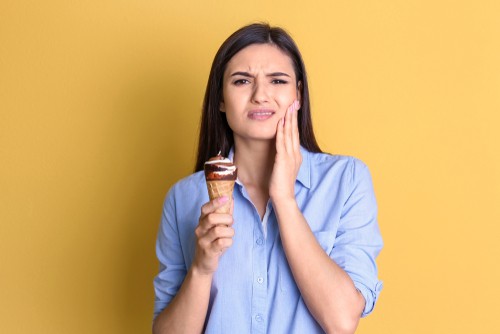
Almost all of us have experienced the annoyance and pain associated with tooth sensitivity. In fact, the Academy of General Dentistry estimates that 40 million American adults have sensitive teeth. That’s quite a lot of people who suffer from those unexpected zings of nerve pain every day. So many, in fact, that your dentist in Hendersonville wants to talk all about sensitive teeth in this week’s blog.
Top Causes of Tooth Sensitivity
What exactly is going on when our teeth feel sensitive? Tooth sensitivity is ultimately caused by enamel erosion, which can leave the inner workings of the teeth, including the nerves, exposed to the elements. However, there are a variety of things that can cause enamel erosion, which makes each situation of sensitive teeth unique to the individual. Let’s take a look at some of the top causes of enamel erosion and, therefore, sensitivity.
Brushing Too Hard – Even though it’s important to brush your teeth thoroughly twice a day, it’s equally important to do so properly. Many patients think that the harder they brush the cleaner their teeth will get. But that’s just not the case. Scrubbing too hard can damage that important protective layer of enamel and cause sensitivity.
Grinding Your Teeth – Similarly to brushing too hard, grinding your teeth puts a lot of pressure on the enamel and can easily wear it away. Tooth grinding can also cause chips or cracks to occur which can also increase the likelihood of someone experiencing sensitive teeth.
Gum Disease – A lot, if not most, tooth sensitivity starts and occurs at the gum line. When plaque buildup is not removed and good oral hygiene is not maintained, bacteria get up under the gums which, if not treated, will lead to gum disease. Gum disease can most definitely cause sensitivity and other problems.
How to Treat Tooth Sensitivity
It’s important to note that sensitive teeth aren’t something you should treat at home long term. You should schedule an appointment with your dentist in Hendersonville to find the best treatment for your sensitive teeth. However, there are things you can do to help reduce sensitivity or avoid it in the first place.
Easy on the Hot and Cold Foods
Many times tooth sensitivity is made worse when exposed to hot or cold foods or drinks. We encourage you to try to avoid foods or drinks at these extreme temperatures to help keep sensitivity at bay. Also, another surprising culprit is acidic foods and drinks. Enjoy these in moderation and avoid them if you find they make your sensitivity worse.
Brush With a Soft-Bristled Toothbrush
Everyone should be using a soft-bristled toothbrush to brush their teeth as they’re easier on tooth enamel. Stiffer bristles can easily damage enamel and contribute to sensitivity.
Pick Toothpaste for Sensitivity
Consider switching your toothpaste to one specially formulated for sensitive teeth. Be sure to look for one that has the American Dental Association Seal of Acceptance. This means the product has been tested and its advertising claims validated.
Tooth sensitivity is nothing to take lightly, and nobody should have to live with the surprising zaps of pain or avoid their favorite foods long-term. If you have sensitive teeth, call your dentist in Hendersonville to schedule an appointment today.